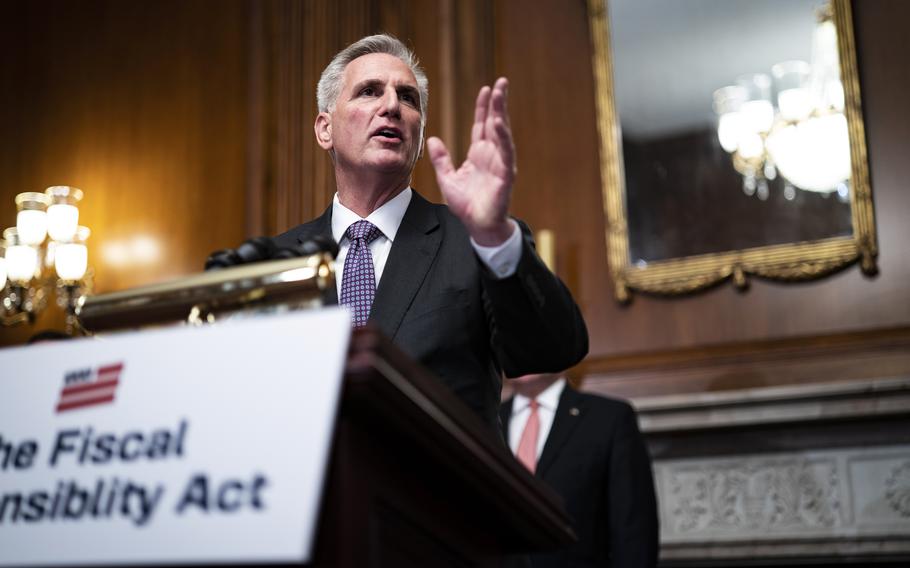
House Speaker Kevin McCarthy (R-Calif.) speaks with reporters at the Capitol in Washington on May 31, 2023. (Jabin Botsford/The Washington Post)
WASHINGTON — House Speaker Kevin McCarthy (R-Calif.) says his chamber has no plans to take up legislation that would boost military aid to Ukraine and other defense spending above the levels allowed in a bill signed into law by President Biden that suspends the debt ceiling and curbs federal spending.
McCarthy’s posture puts him at odds with both Senate Minority Leader Mitch McConnell (R-Ky.) and Senate Majority Leader Charles E. Schumer (D-N.Y.), who assured defense hawks in their chamber that the bipartisan debt deal would not prevent Congress from passing supplemental funding for Ukraine beyond the agreement’s $886 billion for defense in the next fiscal year.
“I’m not going to prejudge what some of them [in the Senate] do, but if they think they’re writing a supplemental because they want to go around an agreement we just made, it’s not going anywhere,” McCarthy told Punchbowl News on Monday.
McCarthy suggested additional aid for Ukraine would have to come as part of the annual congressional appropriations process, meaning cuts could be required elsewhere in the Pentagon’s budget to comply with the just-passed Fiscal Responsibility Act.
“They’re not going to circumvent what we’re doing here,” he told Punchbowl News.
McCarthy added that “the senators are not paying attention to how the system works.”
“We will go through the appropriations process, and we will do the numbers that we just agreed to,” he said.
In a separate interview Monday, McCarthy told CNN that he thinks “efficiencies” can be found in the Pentagon budget, freeing up funding for other priorities.
“I think what we really need to do, we need to get the efficiencies in the Pentagon,” he said. “Think about it, $886 billion. You don’t think there’s waste? … I consider myself a hawk, but I don’t want to waste money. So I think we’ve got to find efficiencies.”
The debt bill, which was negotiated by McCarthy and President Biden, got hung up in the Senate after House passage because of concerns from some senators that the prescribed defense spending is inadequate, particularly as hostilities continue between Russia and Ukraine.
To alleviate those concerns, Schumer and McConnell issued a joint statement saying the “debt ceiling deal does nothing to limit the Senate’s ability to appropriate emergency supplemental funds to ensure our military capabilities are sufficient to deter China, Russia, and our other adversaries.”
Despite the concerns, the Senate passed the House bill without making any changes. Amendments to the bill would have sent it back to the House, which likely would not have had enough time to consider it again before an unprecedented U.S. government default.
Sen. Lindsey O. Graham (R-S.C.), among the senators concerned that defense spending is too low, said he considered McCarthy’s posture to be “a shame” and said he wants to find additional funding for the Pentagon elsewhere in the federal budget.
“The speaker will never convince me that 2 percent below actual inflation is fully funding the Defense Department,” Graham told Punchbowl News. “That cannot be the position of the Republican Party without some contest here. ... We’re playing a dangerous game with our national security. The bill produced is inadequate to the threats we face.”
Fissures opened among Republicans on Ukraine aid months ago, with some House members publicly advocating ending military support.
Congress has appropriated more than $110 billion since the February 2022 invasion by Russia, most of that in economic and military aid.
McCarthy raised eyebrows last fall when he said the House would not write a “blank check” to Ukraine, but it has since supported additional aid packages.
McConnell last week said that McCarthy would need to decide “if he wants to help defeat [Russian President Vladimir] Putin.”